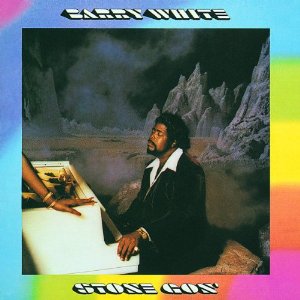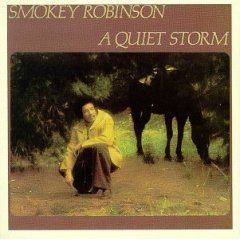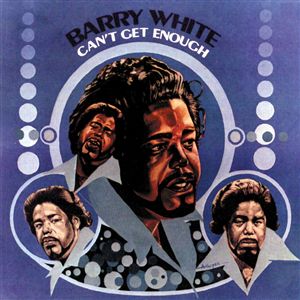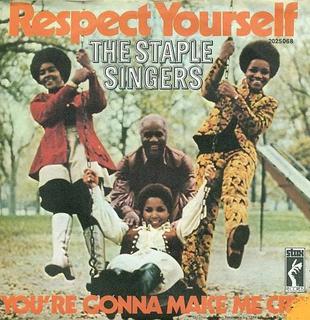
Barry Eugene White was an American singer and songwriter. A two-time Grammy Award winner known for his bass voice and romantic image, his greatest success came in the 1970s as a solo singer and with the Love Unlimited Orchestra, crafting many enduring soul, funk, and disco songs such as his two biggest hits: "Can't Get Enough of Your Love, Babe" and "You're the First, the Last, My Everything".

Stone Gon' is the second studio album by American R&B singer Barry White, released in 1973 on the 20th Century label. The album was arranged by Barry White and Gene Page.

Benjamin Earl King was an American soul and R&B singer and record producer. He rose to prominence as one of the principal lead singers of the R&B vocal group the Drifters, notably singing the lead vocals on three of their biggest hit singles "There Goes My Baby", "This Magic Moment", and "Save the Last Dance for Me".

Chapter II is the second studio album by American singer and songwriter Ashanti. It was released by Murder Inc. and Island Def Jam on July 1, 2003 in the United States.Ashanti reteamed with Murder Inc. head Irv Gotti and producer Chink Santana to work on the album. Chapter II features a guest appearance by rapper Ja Rule, Chink Santana, and Gunnz. Critical reception towards the album was generally mixed, with critics commending the album's autobiographical lyrics, and its fun yet light nature, while other critics felt Chapter II lacked creativity and personality and relied too heavily on the formula of her debut album (2002).

Greatest Hits is a compilation album by American rapper Ice Cube. It was released on December 4, 2001. It compiles 17 of Ice Cube's most well-known songs. Two songs were exclusive to the album, "$100 Bill Y'all" and "In the Late Night Hour".

Raise! is the eleventh studio album by the American band Earth, Wind & Fire, released on November 14, 1981, by ARC/Columbia Records. The album spent 11 weeks atop the Billboard Top R&B albums chart and peaked at No. 5 on the Billboard 200 chart. Raise! has been certified Platinum in the US by the RIAA, Gold in the UK by the BPI and Gold in Canada by Music Canada.

A Quiet Storm is the 1975 third solo album by American soul singer, songwriter, and producer Smokey Robinson. The album received generally positive reviews, and spawned the hit single "Baby That's Backatcha", which spent one week at the top of the Billboard Hot Soul Singles chart.

Can't Get Enough is the third studio album by American R&B/disco singer Barry White, released on August 6, 1974 by the 20th Century label.

Mario is the debut studio album by American singer-songwriter Mario. It was released on July 23, 2002, by J Records. The album debuted at number 9 on the US Billboard 200, with first week sales of 96,000 copies and was eventually certified Gold by the Recording Industry Association of America (RIAA) for sales in excess of 500,000 copies in the United States. Mario was supported by three singles, including "Just a Friend 2002", "Braid My Hair" and "C'Mon".
"(At Your Best) You Are Love" is a song by R&B group the Isley Brothers. It was originally released on their album Harvest for the World. The song was dedicated to their mother, Sally. Although not a single, the song was a radio hit in 1976, and later became a hit for R&B singer Aaliyah in 1994.

Rhapsody in White is the debut studio album by the American soul group The Love Unlimited Orchestra, released in 1974. It was a huge success for the group, which backed and was led by Barry White for many singles such as "I'm Gonna Love You Just a Little More Baby". Also on the album is the 1973 "Love's Theme" single, their signature song, which reached #1 on the Billboard Hot 100.
"Practice What You Preach" is a number-one R&B single by singer Barry White, written by White, Gerald Levert, Edwin Nicholas, from White's 1994 album The Icon Is Love. The hit song spent three weeks at number-one on the US R&B chart and reached 18 on the pop chart. It became a gold record. The 1994 single also won a Soul Train Music Award for Best R&B/Soul Song of the Year.

"Superwoman" is a song by R&B singer Karyn White, released as the second single from her self-titled debut album in January 1989. It was her second U.S. top ten hit, peaking at number eight, and her second U.S. R&B number-one hit, holding that position for three weeks. It also earned a gold certification from the Recording Industry Association of America (RIAA).

"Never, Never Gonna Give Ya Up" is a song written, produced and recorded by American singer and songwriter Barry White for his second album, Stone Gon' (1973). In October 1973, it was released as the first single in the United States and reached number two on the Hot R&B/Hip-Hop Songs and number seven on the Billboard Hot 100. It became a gold record. In Europe, it was issued in early 1974 and peaked at number 14 on the UK Singles Chart.
"It's Ecstasy When You Lay Down Next to Me" is a hit song by American singer Barry White. The song was written by Ekundayo Paris and Nelson Pigford, and arranged by Barry White.

"Respect Yourself" is a song by American R&B/gospel group the Staple Singers. Released in late 1971 from their album Be Altitude: Respect Yourself, the song became a crossover hit. The Staple Singers' version peaked at No. 12 on the Hot 100, No. 2 on the Hot Soul Singles chart, and is one of the group's most recognizable hits. In 2002, the song was inducted into the Grammy Hall of Fame, and in 2010 it was ranked #468 on the Rolling Stone list of the 500 Greatest Songs of All Time, moving down 4 spots from #464 in 2004.

Just Another Way to Say I Love You is the self-produced fourth album by American R&B singer Barry White, released in 1975 on the 20th Century label.

I've Got So Much to Give is the debut studio album by American R&B singer Barry White, released on March 27, 1973, on the 20th Century label.

The Man is the self-produced eighth album by soul singer Barry White, released in 1978 on the revived 20th Century-Fox Records label, which saw its name reverted from 20th Century.

The Icon Is Love is the nineteenth studio album by American R&B singer Barry White, which was released on October 4, 1994, on A&M Records. The album represented a major comeback for White both critically and commercially, and went on to become easily his most successful album since his 1970s heyday.
















